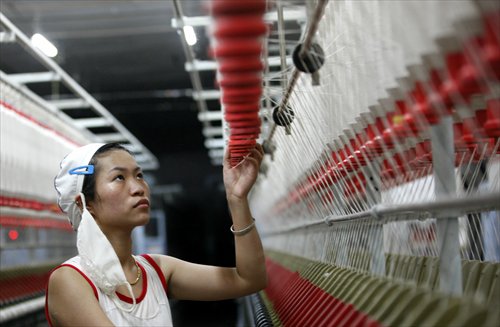HOME >> BUSINESS
Industrial output up 6.1% in August
Source:Agencies-Global Times Published: 2015-9-13 23:28:01
Reading comes amid mixed recent economic data

A worker handles production of yarn to be exported to Southeast Asia at a textile factory in Huaibei, East China's Anhui Province on August 28. Photo: IC

Growth in China's industrial production and retail sales both accelerated in August, government data showed on Sunday, amid increasing international concern about the outlook for the world's second-largest economy.
Industrial output, which measures output at factories, workshops and mines, rose 6.1 percent year-on-year, the National Bureau of Statistics (NBS) announced.
This outpaced July's year-on-year gain of 6.0 percent, but came in below a median forecast of 6.5 percent in a survey of economists by Bloomberg News.
NBS statistician Jiang Yuan attributed the month-on-month increase to improving performance in key industrial sectors and accelerated growth in high-tech industries. In August, high-tech manufacturing grew by 10.5 percent year-on-year and the growth rate was up 0.9 percentage points from July.
Despite the growth, industrial output still faces downward pressure due to flagging demand, Jiang said.
Year-on-year growth in the first eight months stood at 6.3 percent, the same growth level that was seen in the first seven months.
China uses value-added industrial output to measure the final value of industrial production, or the value of gross industrial output minus intermediate input, such as raw materials and labor costs.
The NBS data only tracks the output of large Chinese companies with annual primary business revenues of more than 20 million yuan ($3.16 million).
The figures also showed that industrial output in China's central regions rose by 8.2 percent in August year-on-year, trailed by 7.7 percent in western areas and 6.2 percent in eastern regions. Industrial output in the northeastern areas dropped 0.4 percent.
Retail sales increased 10.8 percent in August from a year earlier, the NBS said.
This exceeded the previous month's 10.5 percent and also bested the median estimate in the Bloomberg survey of 10.6 percent.
The figures are the latest closely watched snapshot of the Asian giant, a key driver of global economic growth, after a series of disappointing indicators during the current third quarter.
China's economy expanded 7.3 percent in 2014, its weakest performance in 24 years, and growth has slowed further so far this year. GDP increased 7.0 percent in each of the first two quarters of this year.
Authorities are officially targeting growth of about 7.0 percent this year, though economists are increasingly seeing that goal as difficult to achieve given recent weakness.
Fixed-assets investment, a measure of government spending on infrastructure, expanded 10.9 percent year-on-year in the January-August period, the NBS said, coming in below the median forecast of a gain of 11.2 percent.
The latest official and private surveys show manufacturing is contracting, while inflation data released Thursday showed consumer price rises accelerating but with factory gate prices in deflation for the 42nd straight month and falling at the fastest pace in six years.
The outlook for China's economy has taken on added importance given weakness in many emerging markets. China accounts for more than 13 percent of the global economy, according to both the IMF and the World Bank.
Authorities have been aggressively dealing with the slowing economy, cutting interest rates five times since last November as well as reducing banks' reserve requirement ratios to spur lending.
But Chinese officials have come under increasing pressure due to concerns about slowing growth, a shock devaluation last month of the yuan and questions over their efforts to prop up the country's stock markets.
Premier Li Keqiang on Thursday took advantage of an address at the Summer Davos meeting in China to reassure his international audience that officials are in control.
Li stressed that while the country has problems, it poses no risk to the global economy and will not experience a "hard landing."
China's leaders are trying to pull off a much-touted retooling of the economic model, moving toward one in which consumer spending rather than heavy investment plays the leading role in driving growth.
Posted in: Economy